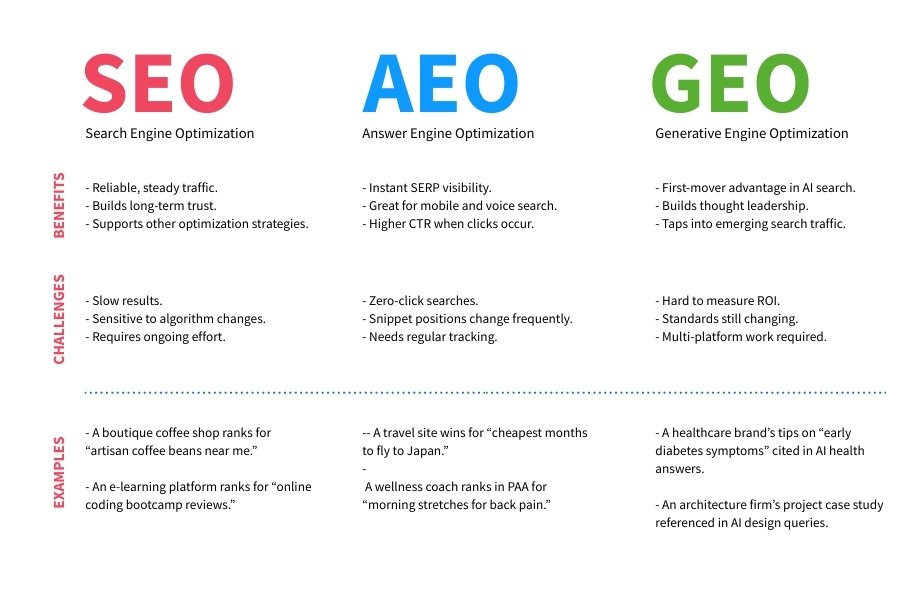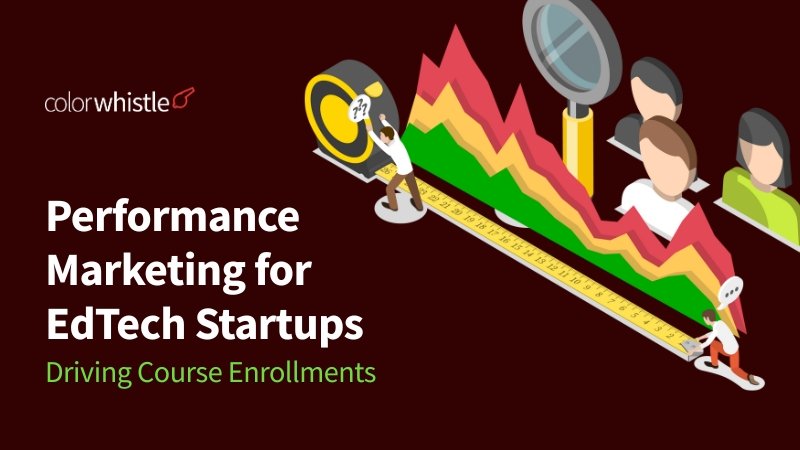AI Summary
Key Highlights of SEO, AEO, and GEO Focus in 2026
This post explores how SEO, AEO, and GEO collectively shape digital visibility in 2026’s AI-driven search landscape. The key insight: SEO remains the foundation, but immediate answer optimization (AEO) and authoritative content for AI (GEO) are essential to stay relevant. It educates marketers and business leaders on leveraging structured data, voice search tactics, and authoritative content creation to capture zero-click traffic and AI citations. Readers will learn how to integrate these strategies to maintain discoverability, authority, and relevance amid evolving search behaviors. The outcome: sustained visibility and competitive edge in an AI-first ecosystem.
Remember when getting to the top of Google’s search results was the ultimate goal?
Search in 2026 is no longer just about ranking on Google. AI-powered experiences like Google SGE, ChatGPT, and Perplexity now deliver instant answers, often without a single click. Nearly 70% of searches end without users visiting a website, as AI summaries and featured answers satisfy intent immediately.
This shift means traditional SEO (Search Engine Optimization) alone is no longer enough. While SEO builds visibility and authority, modern search also requires Answer Engine Optimization (AEO) and Generative Engine Optimization (GEO). AEO helps your content become the direct answer, while GEO ensures your brand is referenced and trusted by AI systems.
Together, SEO, AEO, and GEO define how brands stay visible in an AI-first search landscape. This guide explains the difference, why each matters in 2026, and how to use them together to remain discoverable and competitive.
So, as the digital world continues to evolve, the real question isn’t whether SEO is dead, but rather: SEO vs AEO vs GEO: Which one should you focus on in 2026?
A recent BrightEdge study (2025) found that 68% of online experiences begin with a search engine, but the type of search is changing with AI-powered search queries growing at 30% year-over-year.
TL;DR
This guide breaks down three critical optimization strategies for 2026, SEO, AEO, and GEO and shows you exactly how they work, why they matter, and how to apply them.
Inside, you’ll discover:
- How AI, voice search, and zero-click results are changing search behavior
- The role of SEO in building a strong digital foundation
- How AEO gets your content into featured snippets, voice assistants, and instant answers
- How GEO helps your brand get cited in AI-generated content from ChatGPT, Google SGE, and more
- A step-by-step strategic plan to integrate all three for maximum visibility
The Rise of Zero-Click Searches
Nearly 80% of people tap into AI summaries in at least 4 out of every 10 searches.
For businesses, this means organic visibility no longer guarantees clicks. The battle is now about being the answer, not just being on the list of options.
Also Read
SEO vs AEO vs GEO: The New Era of Digital Visibility
These aren’t just buzzwords; they represent a seismic shift in how content is discovered, consumed, and valued. So, in 2026, where should your attention be: SEO, AEO, or GEO? The answer isn’t simple, but this blog will guide you through the nuances, strengths, and strategic implications of each.

What is SEO?
SEO is the process of optimizing a website and its content to rank higher in traditional search engine results pages (SERPs) like Google and Bing
What is AEO?
AEO is the process of optimizing content to be easily interpreted and cited by “answer engines,” such as Google’s featured snippets, voice assistants (like Siri or Alexa), and knowledge panels
What is GEO?
GEO is the process of optimizing content to be used as a source by large language models (LLMs) and other generative AI tools, such as ChatGPT, Gemini, and Microsoft Copilot
Traditional SEO: The Foundation of Digital Discovery
SEO remains the foundation for online discoverability. Even AI-driven answers often source their information from highly-ranked, authoritative websites.
Core Elements of SEO:
- Content: Create high-quality, useful content that directly answers what people are searching for
- Keywords: Use relevant words and phrases in your content to match what users are typing into search engines
- On-Page SEO: Optimize the content on each page like titles and headings, so search engines can easily understand it
- Technical SEO: Make sure your website is fast, secure, mobile-friendly, and easy for search engine crawlers to navigate
- Off-Page SEO: Build your website’s authority and trust by getting links from other reputable sites
- User Experience (UX): Ensure your site is easy to use and provides a great experience for every visitor
- E-E-A-T (Experience, Expertise, Authoritativeness, and Trustworthiness): Demonstrate real-world experience and expertise to build authority and trust with both users and search engines
- Search Intent: Go beyond keywords to truly understand what a user wants to find, and then provide a direct and comprehensive answer
- Structured Data: Implement schema markup to give search engines clearer context about your content, increasing its chances of appearing in rich results such as featured snippets and AI-generated overviews
- Core Web Vitals: Focus on creating a fast, stable, and responsive website, as this directly impacts the user experience and is a critical ranking factor
- Internal Linking: Strategically link your own pages to each other to create a clear site structure and help both users and search engines discover more of your content
- Multimedia Optimization: Optimize images, videos, and other media with descriptive file names and alt text to increase visibility in visual and video search results
- Crawlability & Indexability: Ensure search engines can easily find and understand all the important pages on your website
- Structured Data: Use special code (schema markup) to provide search engines with specific context about your content, which can lead to rich results in search
- Voice Search Optimization: Structure your content to provide quick, direct answers to conversational questions that people ask voice assistants
- Backlinks: Earn links from other reputable websites to build authority, as these act as a “vote of confidence” for your content
- XML Sitemaps: Provide a map of your website to search engines, helping them discover and index all your important pages
- URL Structure: Create clean, simple, and descriptive URLs that are easy for both users and search engines to understand
Why SEO Still Matters in 2026:
- Search engines remain dominant: Despite the rise of AI, Google and Bing still drive massive traffic
- Intent-driven traffic: SEO captures users actively searching for solutions
- Long-term ROI: Unlike paid ads, SEO builds sustainable visibility
- Strong SEO supports both AEO and GEO initiatives
Challenges in 2026:
- Zero-click searches: AI summaries and featured snippets often answer queries without a click
- SERP real estate shrinking: Ads, AI boxes, and rich results push organic listings down
- Algorithm volatility: Frequent updates demand constant adaptation
Answer Engine Optimization (AEO): Optimizing for Direct Answers
Voice search adoption is accelerating, and direct answers are dominating mobile SERPs.
These include:
Google’s Search Generative Experience (SGE)
Bing’s AI-powered Copilot
Voice assistants like Alexa, Siri, and Google Assistant
Key AEO Strategies:
- Use structured data: Schema markup helps engines parse your content
- Write in Q&A format: Clear, concise answers improve snippet eligibility
- Optimize for voice search: Use natural language and conversational tone
- Include FAQs: These are goldmines for answer engines
Benefits of AEO:
- Featured snippet visibility: Your content appears above traditional results through featured snippets and AI summaries
- Voice search dominance: AEO is crucial for smart speaker queries, Strong presence in voice search results
- Zero-click relevance: Even if users don’t click, your brand gets exposure
Limitations:
- Reduced traffic: Users may get answers without visiting your site
- Measurement complexity: Traditional analytics don’t capture snippet impressions
- Content cannibalization: Your own content may be summarized by AI without attribution
Generative Engine Optimization (GEO): The New Frontier
AI is increasingly becoming the first place people look for research-heavy or complex queries.
GEO Strategies:
- Create authoritative content: AI prefers well-researched, factual material
- Use citations and sources: Referenced content is more likely to be surfaced
- Structure for clarity: Use semantic HTML, clear headings, and logical flow
- Avoid fluff: AI tools prioritize substance over style
Why GEO Is Critical in 2026:
- AI is the new search layer: Users increasingly ask AI tools instead of Googling
- Brand mentions in AI responses: GEO helps your content get quoted or referenced
- Indirect influence: Even without clicks, your expertise shapes user decisions
Challenges:
- No direct traffic: GEO is about visibility, not visits
- Opaque algorithms: LLMs don’t reveal how they choose sources
- Rapid evolution: GEO best practices are still forming
Also Read
Strategic Recommendations – What Should You Focus On?
The short answer? All three, but in a phased, ROI-driven order. Your investment should depend on your industry, audience behavior, and growth goals.
The right approach depends on where your brand stands today and how search is evolving:
Secure the Foundation (SEO)
No matter your industry, a strong technical and content SEO framework is non-negotiable. Without it, both AEO and GEO efforts will struggle. If your website loads slowly, lacks crawlable structure, or fails Core Web Vitals, you’ll struggle in traditional search and in AI-driven engines.
Recommendation:
Audit technical SEO quarterly
Build evergreen, topic-cluster content to dominate core keywords
Earn reputable backlinks to strengthen domain authority
Expand into Direct Answer Visibility (AEO)
Once the basics are locked in, focus on structuring content for instant answers. This doesn’t just win voice searches, it’s also your ticket into featured snippets and “People Also Ask” boxes that dominate the first page.
Recommendation:
Add schema markup (FAQ, How-to, Product) for every relevant page
Rewrite key content in concise, question-and-answer formats
Use conversational language that mirrors how real people ask questions
Position for the Generative AI Era (GEO)
Generative engines like Google SGE, ChatGPT, and Perplexity are reshaping how people consume information. Brands that supply high-quality, well-cited content now will own authority in these AI-driven answers later.
Recommendation:
Publish research-backed, in-depth resources that are difficult to replicate
Strengthen E-E-A-T with author credentials, citations, and credible sourcing
Maintain content freshness, AI models prioritize updated, trustworthy sources
Integrate, Don’t Isolate
The highest-performing strategies in 2026 will weave SEO, AEO, and GEO together. An article optimized for traditional search should also be snippet-ready and AI-citation-friendly.
Recommendation:
Plan content briefs that address all three layers from the start
Measure success across ranking, snippet capture, and AI tool mentions
Continuously update content to stay relevant in all search environments
Wrap-Up
In 2026, digital visibility is no longer a one-dimensional game. SEO remains essential, but AEO and GEO are redefining how content is surfaced and trusted.
SEO builds the foundation. AEO captures immediate attention. GEO establishes authority in AI-driven discovery. Brands that integrate all three will not only adapt to change but lead in an increasingly AI-first search ecosystem.
Whether you’re optimizing for Google, Alexa, or ChatGPT, the goal is the same: be discoverable, be authoritative, and be relevant.
So, which one will you focus on first?
Browse our ColorWhistle page for more related content and learn about our services. To contact us and learn more about our digital marketing services, please visit our Contact Us page.
What’s Next?
Now that you’ve had the chance to explore our blog, it’s time to take the next step and see what opportunities await!





